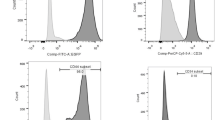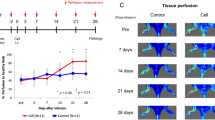Summary
Angiogenic gene therapy and cell-based therapy for peripheral arterial disease(PAD) have been studied intensively currently. This study aimed to investigate whether combining mesenchymal stem cells(MSCs) transplantation with ex vivo human hepatocyte growth factor(HGF) gene transfer was more therapeutically efficient than the MSCs therapy alone in a rat model of hindlimb ischemia. One week after establishing hindlimb ischemia models, Sprague-Dawley(SD) rats were randomized to receive HGF gene-modified MSCs transplantation(HGF-MSC group), untreated MSCs transplantation (MSC group), or PBS injection(PBS group), respectively. Three weeks after injection, angiogenesis was significantly induced by both MSCs and HGF-MSCs transplantation, and capillary density was the highest in the HGF-MSC group. The number of transplanted cell-derived endothelial cells was greater in HGF-MSC group than in MSC group after one week treatment. The expression of angiogenic cytokines such as HGF and VEGF in local ischemic muscles was more abundant in HGF-MSC group than in the other two groups. In vitro, the conditioned media obtained from HGF-MSCs cultures exerted proproliferative and promigratory effects on endothelial cells. It is concluded that HGF gene-modified MSCs transplantation therapy may induce more potent angiogenesis than the MSCs therapy alone. Engraftment of MSCs combined with angiogenic gene delivery may be a promising therapeutic strategy for the treatment of severe PAD.
Similar content being viewed by others
References
Belch JJ, Topol EJ, Agnelli G, et al. Critical issues in peripheral arterial disease detection and management: a call to action. Arch Intern Med, 2003,163(8):884–892
Weitz JI, Byrne J, Clagett GP, et al. Diagnosis and treatment of chronic arterial insufficiency of the lower extremities: a critical review. Circulation, 1996,94(11): 3026–3049
Bobek V, Taltynov O, Pinterova D, et al. Gene therapy of the ischemic lower limb-Therapeutic angiogenesis. Vascul Pharmacol, 2006,44(6):395–405
Dormandy JA, Rutherford RB. Management of peripheral arterial disease(PAD). TASC Working Group. TransAtlantic Inter-Society Consensus(TASC). J Vasc Surg, 2000,31(1 Pt 2):S1–S296
Hamou C, Callaghan MJ, Thangarajah H, et al. Mesenchymal stem cells can participate in ischemic neovascularization. Plast Reconstr Surg, 2009,123(2 Suppl):45S–55S
Al-Khaldi A, Al-Sabti H, Galipeau J, et al. Therapeutic angiogenesis using autologous bone marrow stromal cells: improved blood flow in a chronic limb ischemia model. Ann Thorac Surg, 2003,75(1):204–209
Kinnaird T, Stabile E, Burnett MS, et al. Local delivery of marrow-derived stromal cells augments collateral perfusion through paracrine mechanisms. Circulation, 2004,109(12):1543–1549
Iwase T, Nagaya N, Fujii T, et al. Comparison of angiogenic potency between mesenchymal stem cells and mononuclear cells in a rat model of hindlimb ischemia. Cardiovasc Res, 2005,66(3):543–551
Picinich SC, Mishra PJ, Glod J, et al. The therapeutic potential of mesenchymal stem cells. Cell- & tissue-based therapy. Expert Opin Biol Ther, 2007,7(7):965–973
Ozawa K, Sato K, Oh I, et al. Cell and gene therapy using mesenchymal stem cells(MSCs). J Autoimmun, 2008,30(3):121–127
Kim SW, Lee DW, Yu LH, et al. Mesenchymal stem cells overexpressing GCP-2 improve heart function through enhanced angiogenic properties in a myocardial infarction model. Cardiovasc Res, 2012,95(4):495–506
Morishita R, Nakamura S, Hayashi S, et al. Therapeutic angiogenesis induced by human recombinant hepatocyte growth factor in rabbit hind limb ischemia model as cytokine supplement therapy. Hypertension, 1999,33(6):1379–1384
Wang S, Qin X, Sun D, et al. Effects of hepatocyte growth factor overexpressed bone marrow-derived mesenchymal stem cells on prevention from left ventricular remodelling and functional improvement in infarcted rat hearts. Cell Biochem Funct, 2012,30(7): 574–581
Cho KR, Choi JS, Hahn W, et al. Therapeutic angiogenesis using naked DNA expressing two isoforms of the hepatocyte growth factor in a porcine acute myocardial infarction model. Eur J Cardiothorac Surg, 2008,34(4):857–863
Yuan B, Zhao Z, Zhang YR, et al. Short-term safety and curative effect of recombinant adenovirus carrying hepatocyte growth factor gene on ischemic cardiac disease. In Vivo, 2008,22(5):629–632
Nakamura Y, Morishita R, Nakamura S, et al. A vascular modulator, hepatocyte growth factor, is associated with systolic pressure. Hypertension, 1996,28(3):409–413
Matsumoto R, Omura T, Yoshiyama M, et al. Vascular endothelial growth factor-expressing mesenchymal stem cell transplantation for the treatment of acute myocardial infarction. Arterioscler Thromb Vasc Biol, 2005,25(6):1168–1173
Kinnaird TD, Stabile E, Burnett MS, et al. HIF-1alpha/VP16 enhances the in-vitro arteriogenic potential of mesenchymal stem cells. Circulation, 2003,108:337A
Li L, Zhang Y, Li Y, et al. Mesenchymal stem cell transplantation attenuates cardiac fibrosis associated with isoproterenol-induced global heart failure. Transpl Int, 2008,21(12):1181–1189
Dull T, Zufferey R, Kelly M, et al. A third-generation lentivirus vector with a conditional packaging system. J Virol, 1998,72(11):8463–8471
Hobo K, Shimizu T, Sekine H, et al. Therapeutic angiogenesis using tissue engineered human smooth muscle cell sheets. Arterioscler Thromb Vasc Biol, 2008,28(4):637–643
Wang JS, Shum-Tim D, Galipeau J, et al. Marrow stromal cells for cellular cardiomyoplasty: feasibility and potential clinical advantages. J Thorac Cardiovasc Surg, 2000,120(5):999–1005
Duan HF, Wu CT, Wu DL, et al. Treatment of myocardial ischemia with bone marrow-derived mesenchymal stem cells overexpressing hepatocyte growth factor. Mol Ther, 2003,8(3):467–474
Yang ZJ, Ma DC, Wang W, et al. Experimental study of bone marrow-derived mesenchymal stem cells combined with hepatocyte growth factor transplantation via noninfarct-relative artery in acute myocardial infarction. Gene Ther, 2006,13(22):1564–1568
Zhao MZ, Nonoguchi N, Ikeda N, et al. Novel therapeutic strategy for stroke in rats by bone marrow stromal cells and ex vivo HGF gene transfer with HSV-1 vector. J Cereb Blood Flow Metab, 2006,26(9):1176–1188
Guo Y, He J, Wu J, et al. Locally overexpressing hepatocyte growth factor prevents post-ischemic heart failure by inhibition of apoptosis via calcineurin-mediated pathway and angiogenesis. Arch Med Res, 2008,39(2):179–188
Bian L, Guo ZK, Wang HX, et al. In vitro and in vivo immunosuppressive characteristics of hepatocyte growth factor-modified murine mesenchymal stem cells. In Vivo, 2009,23(1):21–27
Neuss S, Becher E, Woltje M, et al. Functional expression of HGF and HGF receptor/c-met in adult human mesenchymal stem cells suggests a role in cell mobilization, tissue repair, and wound healing. Stem Cells, 2004,22(3):405–414
Cai L, Johnstone BH, Cook TG, et al. Suppression of hepatocyte growth factor production impairs the ability of adipose-derived stem cells to promote ischemic tissue revascularization. Stem Cells, 2007,25(12):3234–3243
Sakon M, Kita Y, Yoshida T, et al. Plasma hepatocyte growth factor levels are increased in systemic inflammatory response syndrome. Surg Today, 1996,26(4):236–241
Rosu-Myles M, Stewart E, Trowbridge J, et al. A unique population of bone marrow cells migrates to skeletal muscle via hepatocyte growth factor/c-met axis. J Cell Sci, 2005,118(Pt 19):4343–4352
Forte G, Minieri M, Cossa P, et al. Hepatocyte growth factor effects on mesenchymal stem cells: proliferation, migration, and differentiation. Stem Cells, 2006,24(1): 23–33
Aoki M, Morishita R, Taniyama Y, et al. Angiogenesis induced by hepatocyte growth factor in non-infarcted myocardium and infarcted myocardium: up-regulation of essential transcription factor for angiogenesis, ets. Gene Ther, 2000,7(5):417–427
Van Belle E, Witzenbichler B, Chen D, et al. Potentiated angiogenic effect of scatter factor/hepatocyte growth factor via induction of vascular endothelial growth factor: the case for paracrine amplification of angiogenesis. Circulation, 1998,97(4):381–390
Xin X, Yang S, Ingle G, et al. Hepatocyte growth factor enhances vascular endothelial growth factor-induced angiogenesis in vitro and in vivo. Am J Pathol, 2001,158(3):1111–1120
Zhu XY, Zhang XZ, Xu L, et al. Transplantation of adipose-derived stem cells overexpressing hHGF into cardiac tissue. Biochem Biophys Res Commun, 2009,379(4):1084–1090
Morishita R. Recent progress in gene therapy for cardiovascular disease. Circ J, 2002,66(12):1077–1086
Kinnaird T, Stabile E, Burnett MS, et al. Bone-marrow-derived cells for enhancing collateral development: mechanisms, animal data, and initial clinical experiences. Circ Res, 2004,95(4):354–363
Author information
Authors and Affiliations
Corresponding author
Additional information
Both authors contributed equally to this work.
This project was supported by a grant from the National Natural Science Foundation of China (No. 30470457).
Rights and permissions
About this article
Cite this article
Su, Gh., Sun, Yf., Lu, Yx. et al. Hepatocyte growth factor gene-modified bone marrow-derived mesenchymal stem cells transplantation promotes angiogenesis in a rat model of hindlimb ischemia. J. Huazhong Univ. Sci. Technol. [Med. Sci.] 33, 511–519 (2013). https://doi.org/10.1007/s11596-013-1151-6
Received:
Revised:
Published:
Issue Date:
DOI: https://doi.org/10.1007/s11596-013-1151-6




